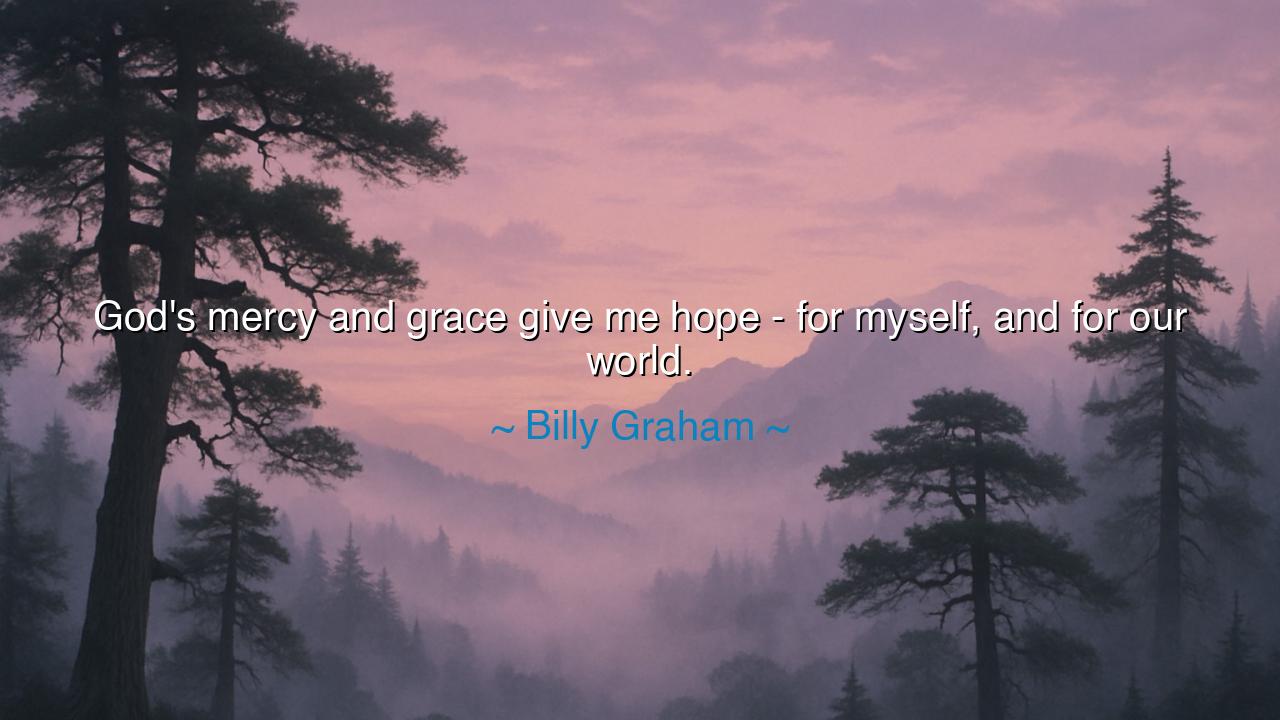
God's mercy and grace give me hope - for myself, and for our






“God’s mercy and grace give me hope — for myself, and for our world.” These words, spoken by the preacher Billy Graham, are not mere comfort but a revelation — a whisper from eternity reminding mankind that though darkness lingers, light is never far away. To understand this quote is to understand the heartbeat of faith itself. Mercy is the hand that withholds judgment; grace is the hand that gives love undeserved. Together, they form the bridge between the fallen and the divine, between despair and hope. Graham’s words rise like incense — a humble acknowledgment that what saves us is not our might or our wisdom, but the boundless compassion of God.
From the dawn of human history, man has wrestled with guilt, loss, and the burden of imperfection. Empires have risen and crumbled under the weight of pride and cruelty, yet still, there blooms within the human heart a longing — the yearning for redemption. Billy Graham, a voice of the twentieth century yet echoing ancient truths, recognized that our hope does not spring from human progress alone but from divine forgiveness. When he speaks of mercy, he speaks of a God who does not cast away the broken, who calls to the wanderer in the night and says, “Come home.” And when he speaks of grace, he reveals a power that transforms the sinner into a vessel of love, the wounded into a healer.
Consider the story of John Newton, a man once lost in the cruelty of the slave trade, whose soul was steeped in darkness. Yet through the mercy and grace of God, his heart was changed. From his repentance was born the hymn Amazing Grace, a song that has carried countless souls across centuries of sorrow. Newton’s life became living proof of what Billy Graham declared — that no one, not even the most fallen, is beyond the reach of divine compassion. His story shows that when grace enters a heart, it does not merely forgive — it renews and rebuilds.
Hope, then, is not a fragile dream. It is the anchor of the soul, fastened in the unshakable goodness of God. In times when nations tremble, when wars rage, when the innocent suffer and hearts grow weary, Graham’s words return like a quiet wind over the ashes: “God’s mercy and grace give me hope — for our world.” It is a hope that believes even the worst of men may yet turn to love, that even the ruins of a broken age can become the foundation of peace. For if mercy and grace flow from the Creator, then no human sin is too deep, no darkness too vast.
In this truth lies a call to every generation: to become instruments of that same mercy and grace. We are not merely to receive them but to embody them — to forgive where we have been wronged, to lift up those who fall, to shine gentleness into the hearts of those hardened by suffering. For in showing mercy, we mirror the heart of God; in offering grace, we carry His hope into the world.
Let none say the world is too far gone, nor that they themselves are too unworthy. As long as mercy flows and grace abides, redemption is never impossible. The one who feels lost in guilt can rise again; the one who sees only decay in the world can yet plant seeds of goodness. Every act of compassion, every gesture of forgiveness, every moment of humility — these are echoes of the divine mercy that sustains creation.
The lesson, then, is clear and radiant: to live by mercy and grace is to live in hope. Be patient with yourself, for God’s mercy is patient. Be generous with others, for His grace overflows. When despair tempts you to give up on the world, remember: it was mercy that stayed the flood in Noah’s time, and grace that sent a rainbow into the storm. So let your own life be such a rainbow — a sign of hope that even in an age of shadows, light yet reigns eternal.






AAdministratorAdministrator
Welcome, honored guests. Please leave a comment, we will respond soon